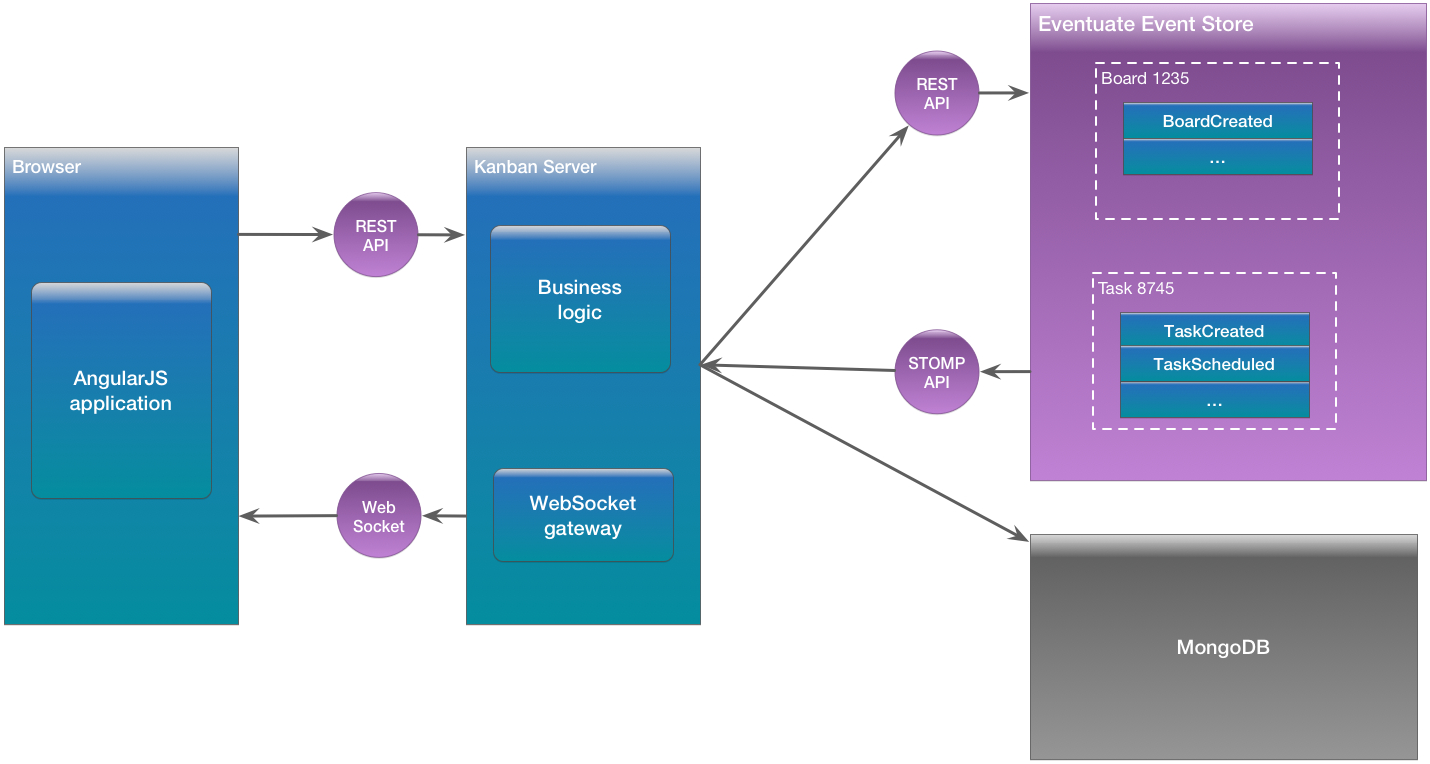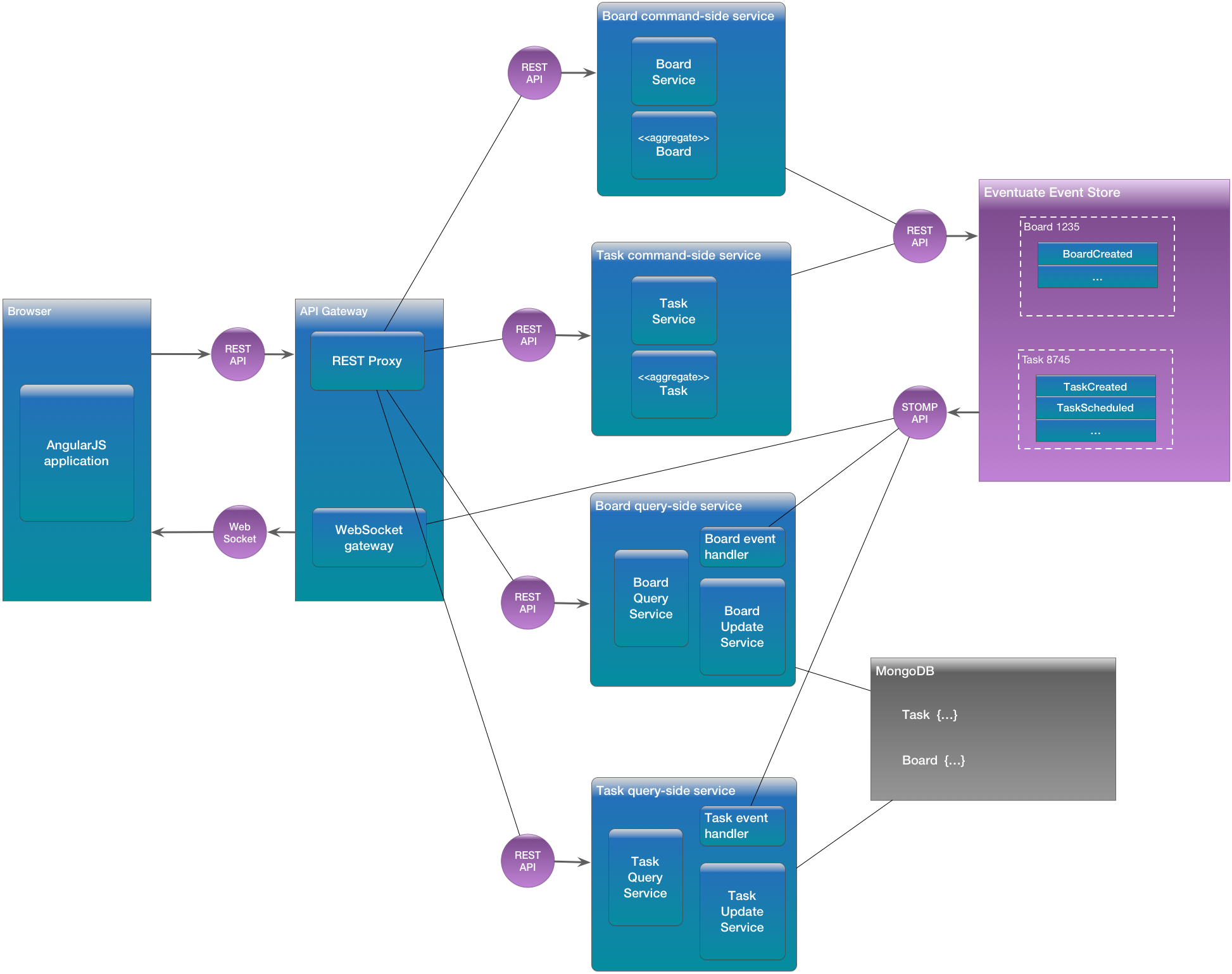eventuate-examples / Es Kanban Board
Programming Languages
Real-time, multi-user Kanban Board demo
This sample application, which is written in Java and uses Spring Boot, demonstrates how you can use the Eventuate™ Platform to build a real-time, multi-user collaborative application. The Kanban Board application enables users to collaboratively create and edit Kanban boards and tasks. Changes made by one user to a board or a task are immediately visible to other users viewing the same board or task.
The Kanban Board application is built using Eventuate™'s Event Sourcing based programming model, which is ideally suited for this kind of application.
The application persists business objects, such as Boards and Tasks, as a sequence of state changing events.
When a user creates or updates a board or task, the application saves an event in the event store.
The event store delivers each event to interested subscribers.
The Kanban application has a event subscriber that turns each event into WebSocket message that trigger updates in each user's browser.
Architecture
The following diagram shows the application architecture:

The application consists of the following:
- AngularJS browser application
- Kanban Server - a Java and Spring Boot-based server-side application.
- MongoDB database - stores materialized views of boards and tasks
The Kanban Board server has a Spring MVC-based REST API for creating, updating and querying Kanban boards and tasks. It also has a STOMP-over-WebSocket API, which pushes updates to boards and tasks to the AngularJS application. It can be deployed as either a monolithic server or as a set of microservices. Read on to find out more.
About Eventuate™
Eventuate is a application platform for writing microservices. It provides a simple yet powerful event-driven programming model that is based on event sourcing and Command Query Responsibility Segregation (CQRS). Eventuate solves the distributed data management problems inherent in a microservice architecture. It consists of a scalable, distributed event store server and client libraries for various languages and frameworks including Java, Scala, and the Spring framework. Learn more.
Kanban Board Server design
The Kanban Board server is written using the Eventuate Client Framework for Java, which provides an event sourcing based programming model for Java/Spring-Boot aplications. The server persists boards and tasks as events in the Eventuate event store. The Kanban Board server also maintains a materialized view of boards and tasks in MongoDB.
The following diagram shows the design of the server:

The application is structured using the Command Query Responsibility Segregation (CQRS) pattern. It consists of the following modules:
-
Command-side module - it handles requests to create and update (e.g. HTTP POST, PUT and DELETE requests) boards and tasks. The business logic consists of event sourcing based
BoardandCommandaggregates. -
Query-side module - it handles query requests (ie. HTTP GET requests) by querying a MongoDB materialized view that it maintains. It consists of an event handler that subscribes to Board and Task events and updates MongoDB.
-
WebSocket gateway - it subscribes to Board and Task events published by the event store and republishes them as web socket events.
Deploy as a monolith or as microservices
The server can either be deployed as a monolith (as shown in the above diagram) or it can be deployed as microservices. The following diagram shows the microservice architecture.

There are the following services:
- API Gateway - routes REST requests to the appropriate backend server, and translates event store events into WebSocket messages.
- Board command side - creates and updates Boards
- Board query side - maintains a denormalized view of boards
- Task command side - creates and updates Tasks
- Board query side - maintains a denormalized view of tasks
Building and running the application
This is a Gradle project. However, you do not need to install Gradle since it will be downloaded automatically. You just need to have Java 8 installed.
The details of how to build and run the services depend slightly on whether you are using Eventuate SaaS or Eventuate Local.
Building and running using Eventuate SaaS
First, must sign up to get your credentials in order to get free access to the SaaS version.
Next, build the application
cd java-server
./gradlew assemble
Next, you can launch the services using Docker Compose:
cd java-server/docker-microservices
docker-compose up -d
Building and running using Eventuate Local
First, build the application
cd java-server
./gradlew assemble -P eventuateDriver=local
Next, launch the services using Docker Compose:
cd java-server/docker-microservices
export DOCKER_HOST_IP=...
docker-compose -f docker-compose-eventuate-local.yml up -d
Note: You need to set DOCKER_HOST_IP before running Docker Compose.
This must be an IP address or resolvable hostname.
It cannot be localhost.
See this guide to setting DOCKER_HOST_IP for more information.
Using the Kanban board
Open the url http://${DOCKER_HOST_IP}:8080, login and create boards and tasks.
Note: DOCKER_HOST_IP is the IP address of the machine running the Docker daemon.
Using the Swagger UI
The individual services are Swagger "enabled".
Open the url http://${DOCKER_HOST_IP}:<SERVICE-PORT>/swagger-ui.html
Got questions?
Don't hesitate to create an issue or contact us.

